
As the chavista regime parted from democratic principles, its circle of commercial alliances has been closing towards a small group of countries that share a strong ideological affinity. Among such countries are Iran, Syria, Turkey, Russia, Belarus, and China. It is with their support that the chavista regime has been able to circumvent the economic sanctions imposed by the United States and Europe in 2017
The many agreements signed between Venezuela and its autocratic peers materialize in full supermarket shelves and working gas stations, but have failed to reactivate the national production system. In addition to making up for the shortage of food, medicine, and gas, Maduro has found new financial routes for Chavismo’s shady businesses
By Gitanjali Wolfermann and Lisseth Boon
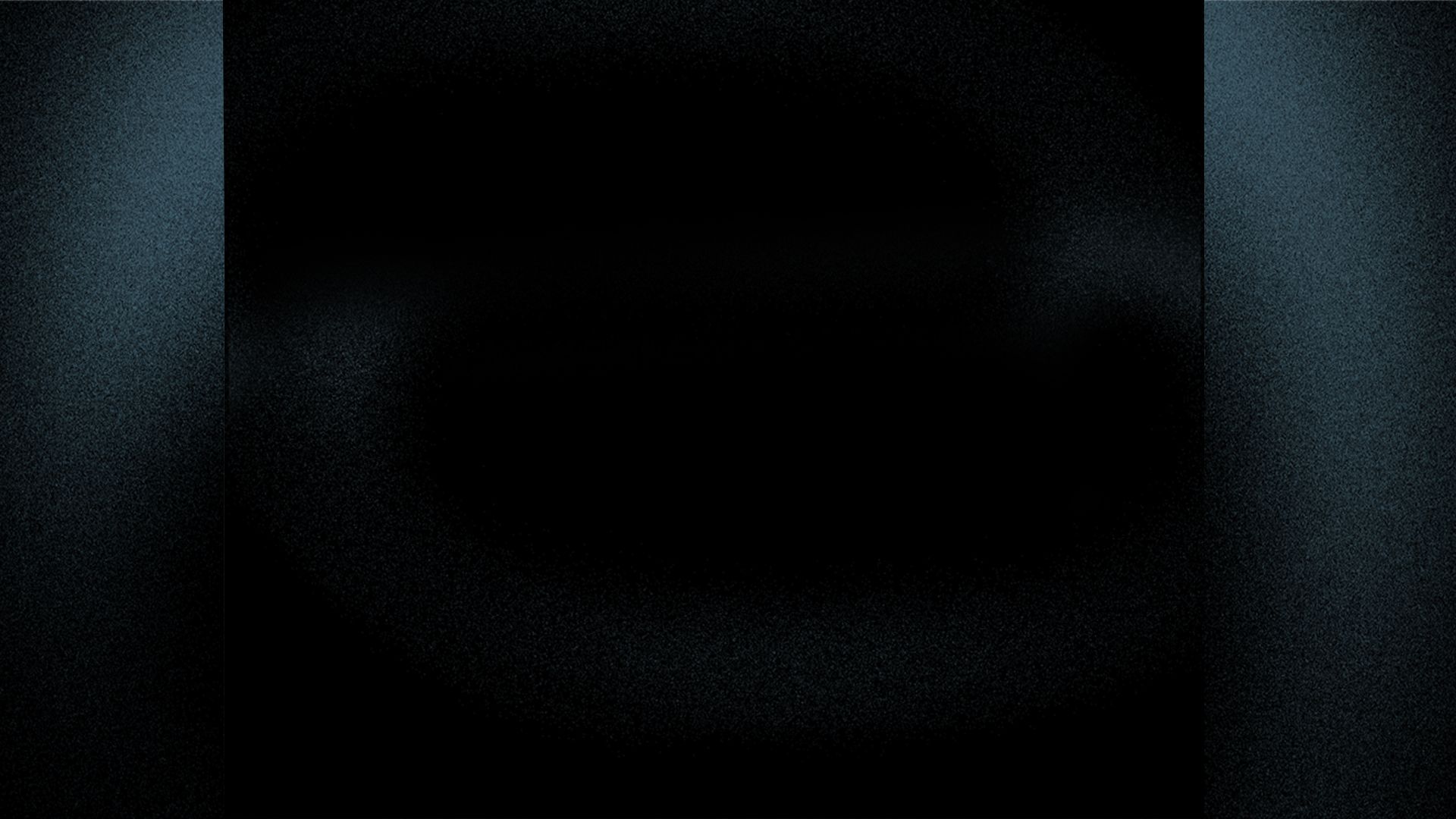
Long gone are the days of empty supermarket shelves. The devastating sight of long lines and shelves without food or supplies; of entire aisles filled with only one product to conceal the drought, are no more than the bitter memory of Venezuela’s years of shortage. At present, it is possible to choose from one or another nationally produced brands of pasta, for instance, as well as a wide range of imported brands. Turkish brands are particularly prominent.
Since 2017, when the United States’ economic sanctions were strengthened, shelves have been filled with Turkish food products like pasta and wheat flour, which had traditionally been imported from the US. These brands became a regular part of Venezuelans’ diets.
At first sight, the packs of spaghetti and rigatoni with “weird names” might pass as other, Venezuelan made, pasta brands; or even globalized Italian brands. However, the phrases printed on the back of the packaging leave no room for confusion: türkiye'de üretilmiştir (made in Turkey). “These are not as good as the national brands. They are a little sticky, but I get these because they’re cheaper”, says a sixty-year-old lady standing near a shelf filled with bar soap, body lotion, and shampoo, all also with a Turkish brand.
Turkish pasta and wheat flour can be found not only in small food stores, but also in traditional supermarkets and the so-called bodegones (convenience stores that sell imported products) that have suddenly appeared with suspicious intensity all over ruined towns and cities of Venezuela over the past five years.
“The empire hits, threatens Iran, Belarus, Venezuela. They bombed, invaded Libya and now Syria. Why? Because we openly refuse to bow, we confront imperialism and we are promoting, with great vigor, the formation of a plurinuclear world, rather than pluripolar ... Venezuela is the nucleus of a pole. Belarus is the nucleus of another major pole… China and other countries are supporting us”.
Turkish spaghetti are even a fixed component in the food boxes subsidized by the CLAP program, even though President Nicolas Maduro assured in March 2021 that the boxed contained “0% imported goods”. The President’s statement was disproved by the official announcement of the arrival from Turkey of 8 thousand tons of pasta for the CLAP boxes last July.
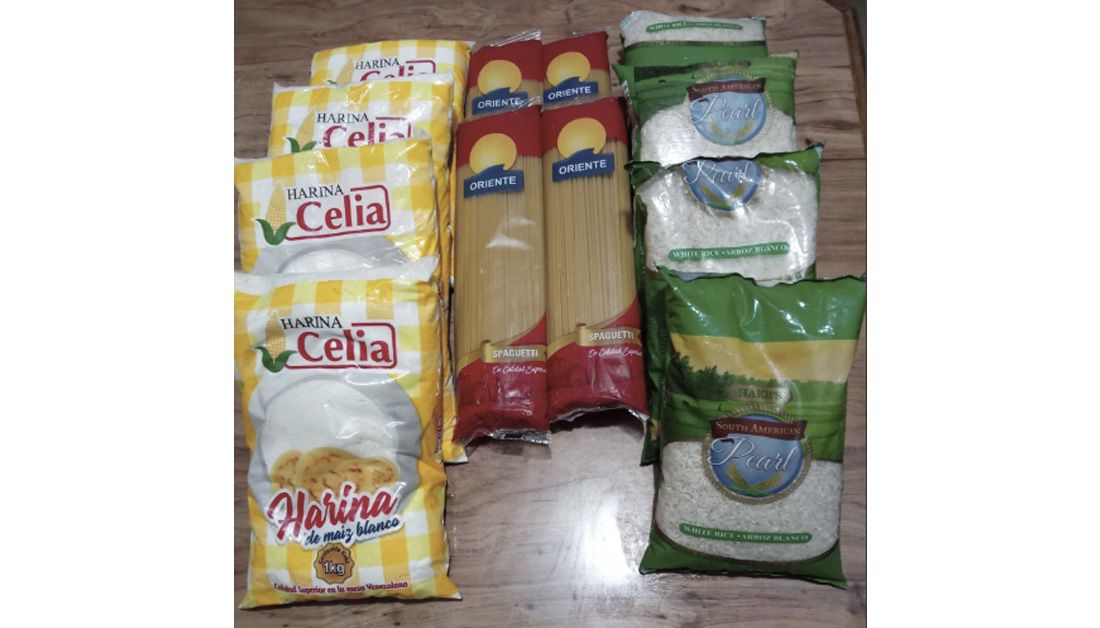
Pasta and flours that are usually included in CLAP boxes
Pasta and flours that are usually included in CLAP boxes
This peculiar alliance with Turkey does not stand alone. As Venezuelan relations with the US have dwindled and Maduro’s international discredit grows thanks to his anti-democratic practices, the government has begun to open to new options, seeking commercial and ideological partners. In several cases, Maduro has relied on relations promoted by former President Hugo Chavez. But he has also made good on relations forged while Maduro acted as the nation’s Foreign Minister between 2006 and 2012.
"This strategic alliance is an example of cooperation between sovereign countries at the beginning of the 21st century, a true model of mutual respect, of shared interest, based on cooperation, friendship and much affection ... China and Venezuela today are great friends, great comrades, our peoples, our revolutions, our governments ”.
No matter the geographic distance, during the past five years Venezuela has strengthened its alliances with nations that share its aversion against the US: authoritarian governments whose heads of State have been too long in power and have high rates of corruption. A revision of the available official documents, such as official journals and press releases from the Ministry of Foreign Affairs, allows to estimate that during the chavismo era Venezuela has entered into some 1,237 conventions, treaties, and cooperation agreements with these nations, worth an amount close to $173 billion. However, the shadiness surrounding these arrangements makes it impossible to discern the true extent of the amounts of money in play.
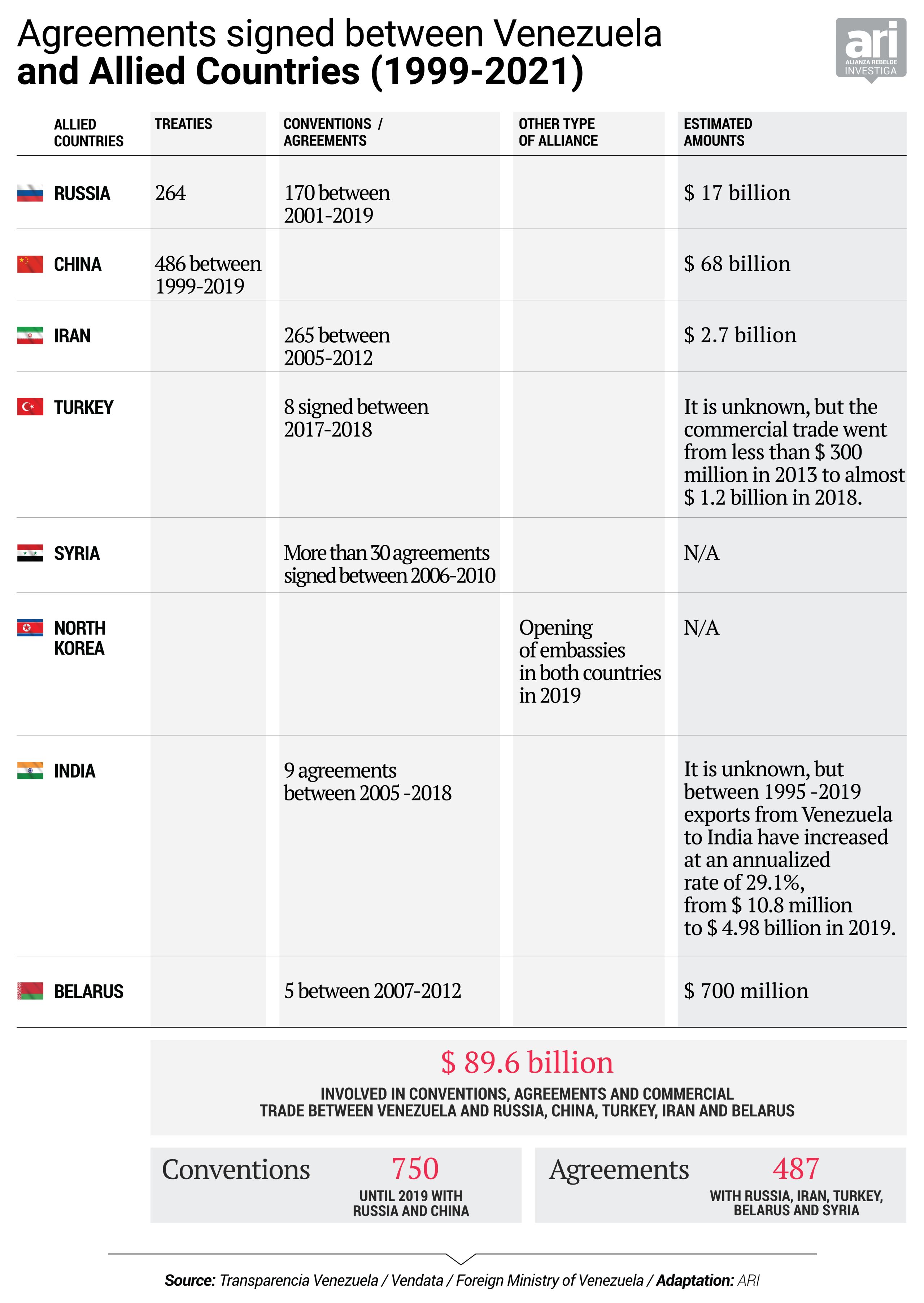
Omar Zambrano, an economist and founder of Anova consultants, published an investigation report that showed that the effect of the sanctions has been opposite to the outcome expected regarding the availability of goods and services. This as a consequence of the liberalization of the economy that has ensued since then, paired with the dollarization and the end of the exchange controls. All of it precisely thanks to the alliances weaved by Maduro’s Administration.
"Thanks to the Bolivarian revolution, we have developed a set of mutually beneficial relations for Venezuela and Russia ... each day more solid in political, geopolitical, scientific, technological areas, now in terms of housing, agriculture, agricultural technology, thermoelectric power, oil processing ... very profitable relationships to continue strengthening Venezuela and Russia ... ”.
“When you look at what happened with the import of food products and medicine to Venezuela, contrary to what you may expect, these items are now more available than before the sanctions were imposed. It is a counterintuitive result, but it is the consequence of the economic liaison with allies like Turkey, Iran, China, India, and Russia”, stated Zambrano.
Zambrano expressed that the economic alliance with these countries has been key to Maduro for three reasons, the first of which is the capacity to commercialize essential goods and services, particularly food and medicine.
Hoy #26May recibimos una donación de alimentos de parte del embajador de Turquía en Venezuela
— Darwin González (@darwingonzalezp) May 26, 2021
Şevki Mütevellioğlu, destinadas nuestros sectores populares. Extendemos nuestro mayor agradecimiento a la @embajadacaracas por ayudarnos a darles #CalidadDeVida a nuestros baruteños. pic.twitter.com/lnsJQkhvkh
Aside from alleviating the shortage, Zambrano explains, these alliances have allowed Maduro to use a correspondent bank financial system that does not depend on traditional finance circuits.
“That is Venezuela playing hard in the new world geopolitics; We are no longer a dwarf country, we are a free homeland, painful as it may be”.
“Just being able to transfer funds into Venezuela –even if just partially– via the financial systems of Russia, Iran, and the Arab Emirates, has served as a substitute for the financial operations they used to run through New York and London”, said the Economics expert.
The experience in avoiding the economic sanctions is the third factor identified by Zambrano. “These are countries with a long tradition of sanctions, particularly Iran and Syria. They have devised a whole new way of doing business and transactions to avoid the siege of the restrictions. That technology has been proven, and Venezuela has been learning from its partners.”
Douglas Farah, a researcher from IBI Consultants who specializes in Latin American Affairs, stated that Venezuela and its allies are guided by political-criminal interests. “With the exception of China and Russia, who are interested in the oil and sale of military equipment, there are no legitimate commercial relations among these nations. Their relationship is based on a policy of hatred against the US, and on the opportunities that this represents for countries that harbor transnational crime as a State instrument to avoid sanctions and launder money while using multilateral institutions such as the UN and the CELA for protection.”
“Syria, a country with whom we share struggles, nationalism, determination to build ourselves according to our own models, determination to prevent or avoid the unipolar hegemony of the United States in the world."
Farah observed that whenever this group of governments boast about their democratic practices, their respect for freedom of expression, and their stance against corruption, they form a choir of voices that is necessary to consolidate authoritarianism. “No matter that China’s Imperialism far exceeds that of the US; that Russia can only be governed by Putin; that North Korea is the most repressive regime in the world; and Turkey is becoming a dictatorship, the narrative maintains that the US is humanity’s worst enemy”, he stated.
Vanessa Neumann, who in 2019 and 2020 acted as the official representative of the Venezuelan President (in charge) –Juan Guaido– for the United Kingdom and Ireland, has said that these allies not only seek to avoid sanctions, but also gain control of Venezuela’s many resources. “Russia, Iran, Syria, Turkey, and Venezuela share the premise of making the elites rich while the rest of the country drowns in poverty. They have demolished their own institutions; any and all forms of checks and balances among State branches; legal and fiscal independence; and are intent on continuing to support the destruction of Venezuelan institutions. The only way that they would stop supporting Maduro is if he became bad business for them”, she stated.
“The people of Arabia and those of Latin America, we are very similar people and with the same spirituality, depth, with the same cultural diversity, the same faith, carriers of a force that has already begun to contribute and will contribute powerfully over the years and decades that come in the salvation of the world ...”.
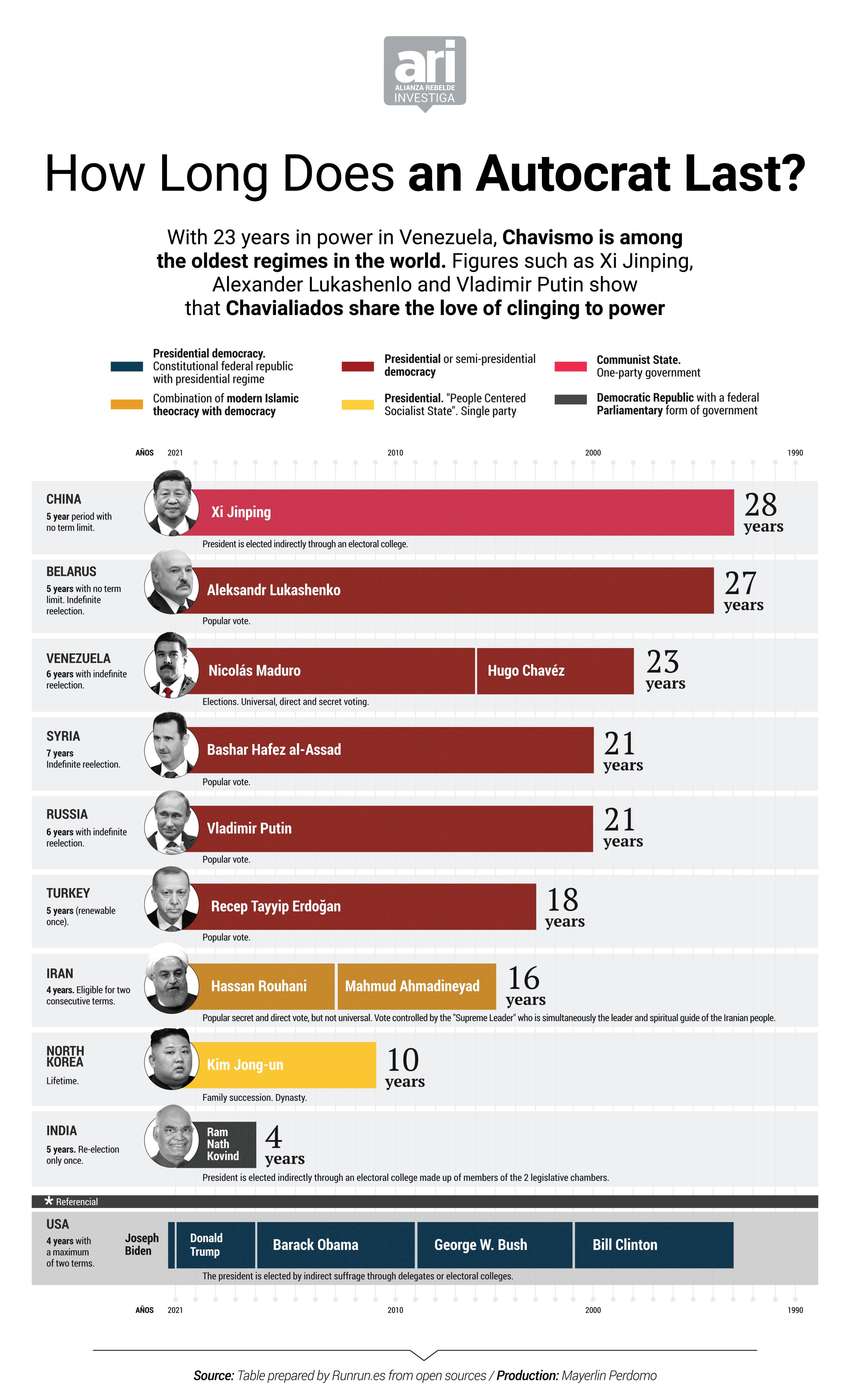
Being an ideological ally is profitable
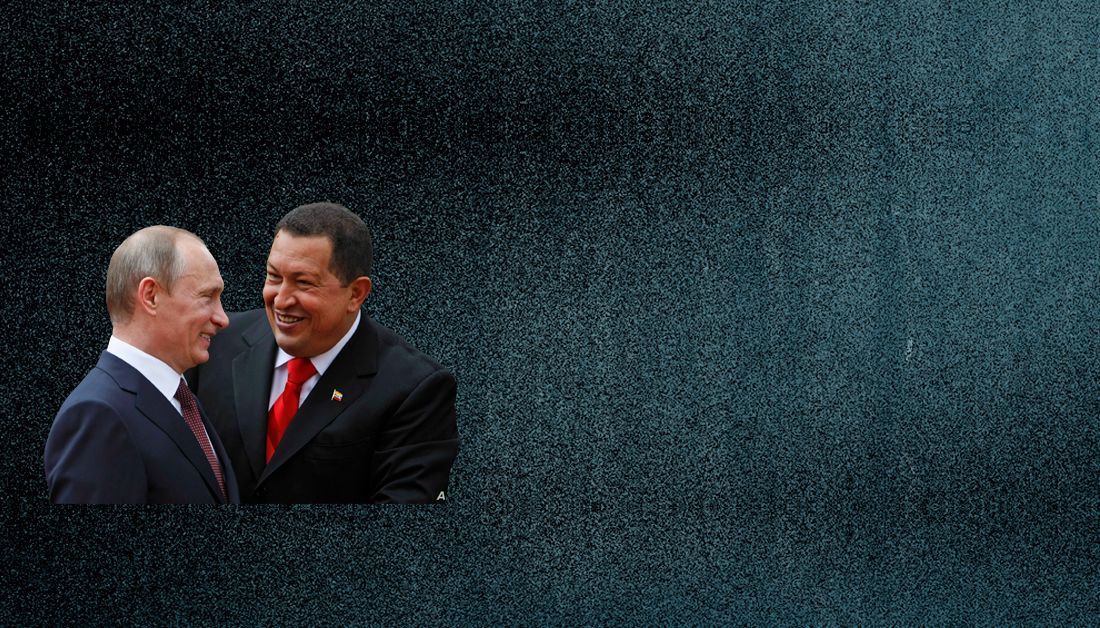
In 2018, when Turkish President Recep Tayyip Erdogan visited Venezuela, Maduro reported that relations with that country were at the beginning stages. “We have made progress in every area. The development of these relations reach 2025 and further. We are committed to making all of the agreements signed a reality. Our country is open to Turkish investment in all areas: oil production, refinement, petro-chemistry, tourism development, commercial improvement, among others.” Eight commercial and cooperation agreements were signed on that occasion.
“Syria and Venezuela and our people, the Arab people, of Latin America and the Caribbean, will play a fundamental role in the construction of that new world. Syria and Venezuela are at the forefront of this struggle of our people”.
The masked but progressive presence of Turkish products in Venezuela is evidence of the advance of imports. In 2020, Venezuela purchased $235,991,393 in products from Turkey, of which $180,428,298 –that is 78% of the total– was in pasta and wheat flour. The same has occurred this year: until May, Turkey sold Venezuela $97,535,280 in products, of which 73% ($70,839,739) were pasta and wheat flour. This according to the Turkstat –the Turkish Statistics Institute.
Turkish imports have increased since 2017, when the shortage of certain food products peaked at 80% as the US reinforced sanctions against the Maduro regime. As of that year, there has been a notorious shift of the commercial liaison promoted almost 7 thousand miles away: purchases from Venezuela to Turkey went from $19,134,000 in 2016 to $235,991,000 in 2020. That is, they increased 12 times over in a matter of five years.
“Here is the Caracas-Damascus, Venezuela-Syria axis, which is highly strategic. Let's not waste a single day, let's not lose a single opportunity to build an immense bridge, a gigantic net for the liberation and salvation of this world ”.
If anything has helped create the bubble of economic reactivation in Caracas as opposed to the generalized gas shortage throughout Venezuela, is the shipment of fuel from Iran. Venezuela’s long-time partner –since the times of Mahmoud Ahmadinejad and Hugo Chavez– came to Maduro’s rescue in 2020, when the US strengthened its sanctions against both countries. Only a few gas stations in Caracas accept payment in devalued Bolivars, while the rest operate in US Dollars. Gas has been transported from the Islamic Republic in tankers operated by State-owned companies. Iran has also provided raw materials for the production of motor fuels.
Not even the COVID-19 pandemic has stalled relations with ally countries, as the 3,230,000 anti-covid vaccines that have reached Venezuela come from Russia with its Sputnik V, and China with the Sinopharm and VeroCell vaccines.
According to Diego Moya Ocampo, a political risk analyst, the main issue is that the alliances of the chavismo have always had an ideological undertone. “Venezuela has sought commercial relationships with countries where Maduro has good relations; which care little about democratic and human rights credentials; and which are useful in avoiding sanctions. There is a component of ideological affinity, but the relationship among these allies is pragmatic and profitable. For instance, there is a significant number of Turkish and Venezuelan businesspeople who are trying to strengthen commercial activity under the umbrella of the trust that exists between Maduro’s Administration and Erdogan’s regime, which has also reached out to the opposition”, said Moya Ocampo.
The political analyst looked into Venezuela’s relationship with Iran, and talked about the inversion of roles in both nations’ situation. “Projects from the Chavez and Ahmadinajad era were mainly agricultural and industrial, because the focus was on Venezuela helping Iran to avoid its sanctions. With Maduro and Rouhani, roles have been inverted due to Venezuela’s isolation. Of course, these are ideological allies, but the relationship between them is extremely utilitarian: Iran demands payment of its imports in advance, and Venezuela pays with gold. There is no line of credit.”
El día de mañana (domingo 21 de Junio) va a llegar el buque Golsan que trae alimentos para inaugurar el primer supermercado iraní en Venezuela. Otro éxito en las relaciones amistosas y fraternales entre dos paises.#IranyVenezuela pic.twitter.com/HVcwxqE9Hb
— Embajada de la R.I. de Irán en Venezuela (@Eiranencaracas) June 20, 2020
Another important partner for Maduro is India. This country has been among the first five destinations for Venezuelan exports since 2014, as a consequence of the several energy development agreements entered into in 2005. Today, the Asian nation is the first destination of Venezuelan crude oil, followed by China, the US, and Spain.
In “Venezuela’s Authoritarian Allies: The Ties That Bind?, edited by Cynthia J. Arnson, director of the Wilson Center’s Latin American Program, there is an argument in favor of the idea that Venezuela and its international allies maintain mutually beneficial relations, although they are motivated by self-interests. “In several cases, this self-interest overlaps the desire to join Venezuela in an ideological, geopolitical, or economic opposition to the United States”, states the text.
Neumann –whose company Asymmetrica has allowed her to gain a deep understanding of the power-based relationships that underline international commerce– explains that even if those allies are interested in keeping chavismo exactly where it is because of the advantages of dealing with an authoritarian country without institutional barriers, the profitability of those business dealings may become more important than who leads.
“The Russians are very interested in gold and natural gas because our reserves have not been developed since the focus was always on oil. They are also coming to Margarita through Russian corporations that are promoting the island as a tourism destination. The problem is that chavistas only focus on activities that do not reactivate the economy”, said the Ambassador.
Evidence of the fact that interests prevail over ideology is described by Arnson: “None of Venezuela’s most important international allies has ever volunteered to subsidize the regime, either during a period of steep economic decline, or as a response to the United States sanctions. While Russia lacks the necessary means, China has tried to reduce its credit exposure in Venezuela in the face of the country’s severe economic dysfunction. India, which is a United States ally, continued to be an important source of cash flow for the Maduro regime until its private corporations –worried by the US sanctions– ceased even their limited exchange of oil for diesel during the final days of the Trump Administration”.
The Wilson Center expert points out the exceptions of Turkey and Iran: states that continue to play an important role. “Venezuela’s strong anti-US stance has resonated in these two countries, which are also under US sanctions. However, both have benefited generously from their trades with Venezuela, receiving payments in gold for products exported to Venezuela (case of Turkey and Iran), and from their help in trading authorized oil (Iran)”, explains Arnson.
“The Republic of Belarus and the Bolivarian Republic of Venezuela today are daughters of the same birth in the 20th century. We rose up resisting the overwhelming currents of imperialism and today we are firmer than ever ... resisting and defeating the currents of North American imperialism that seek to overwhelm the world ... ”.
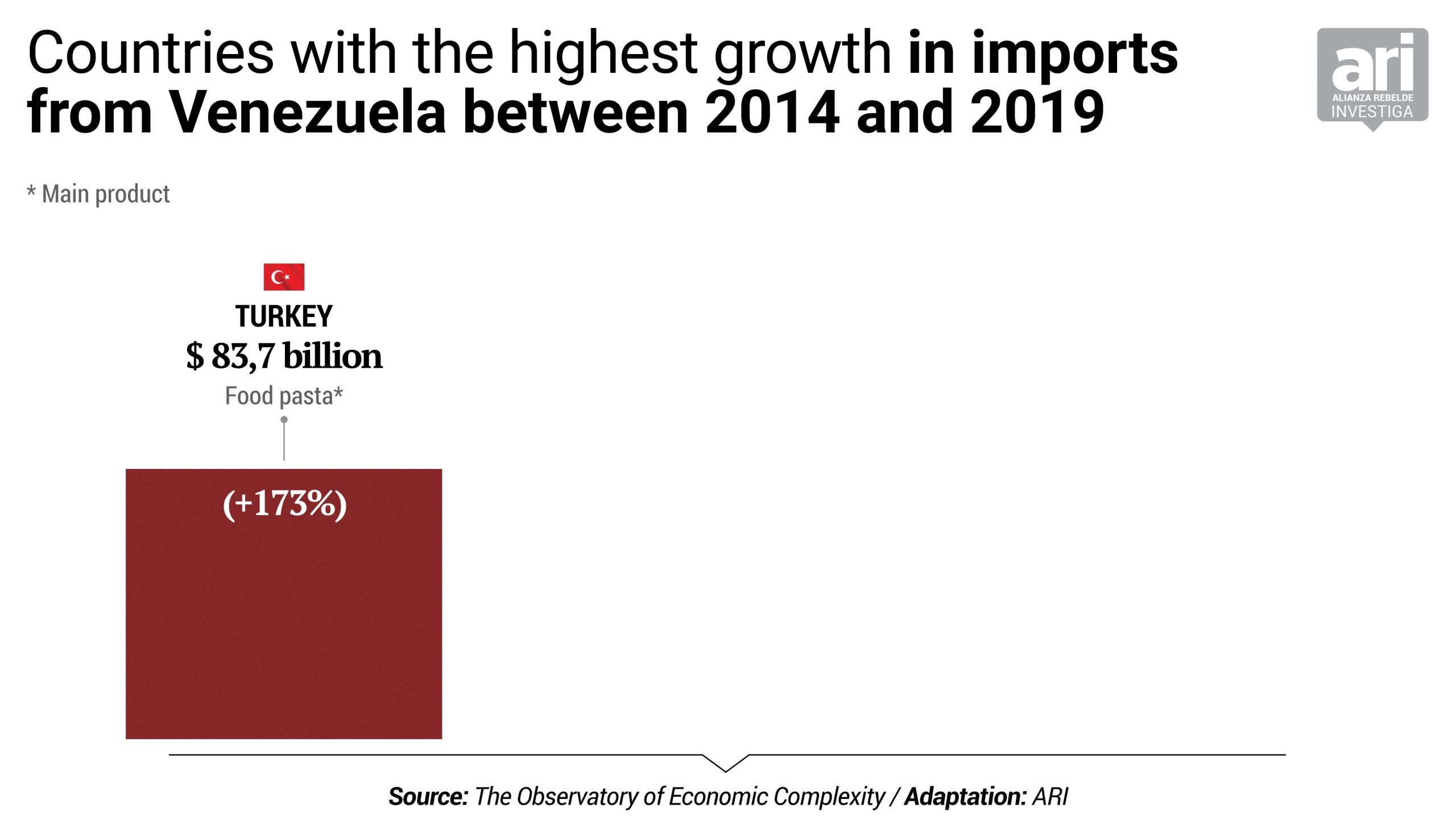
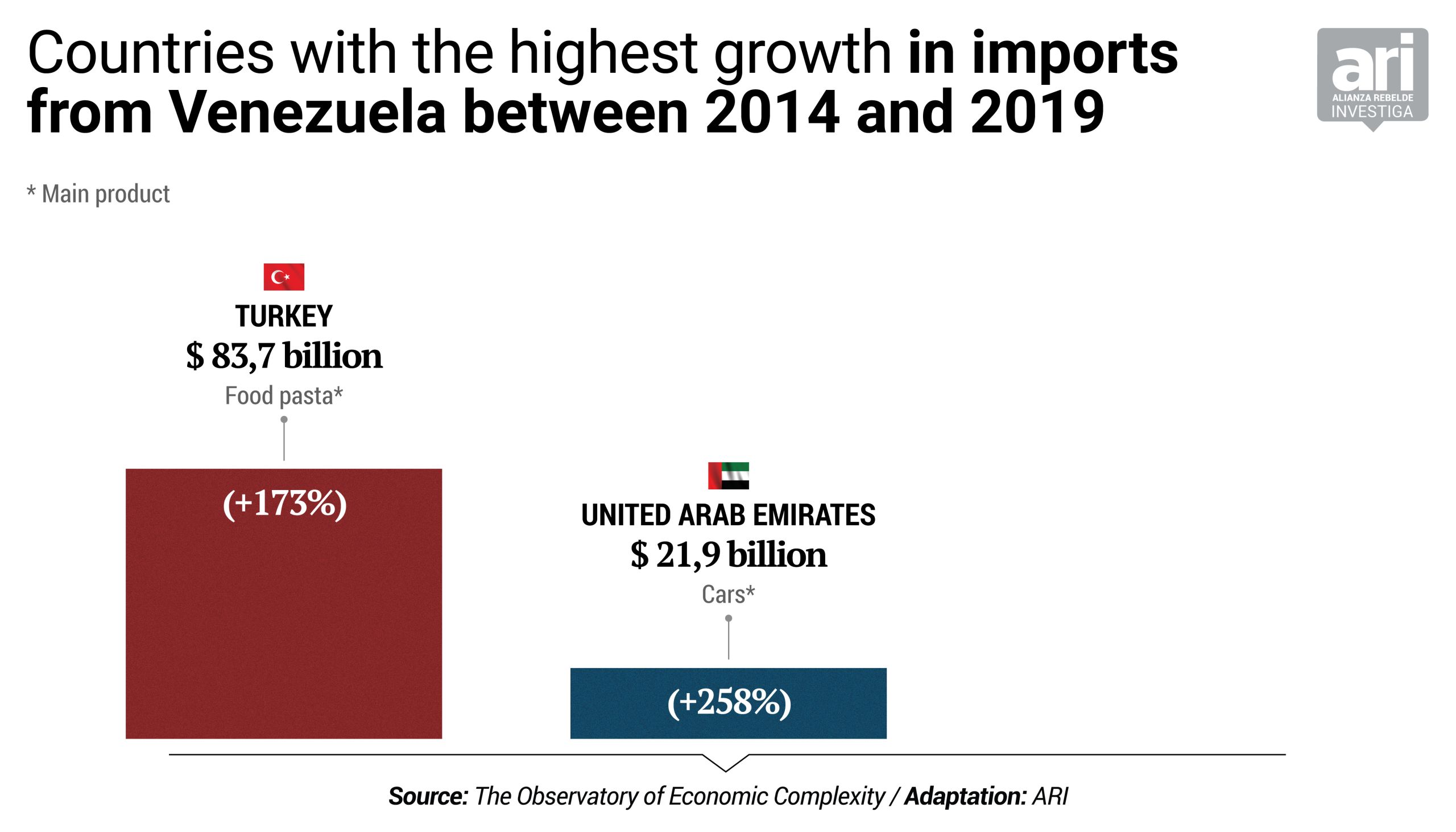
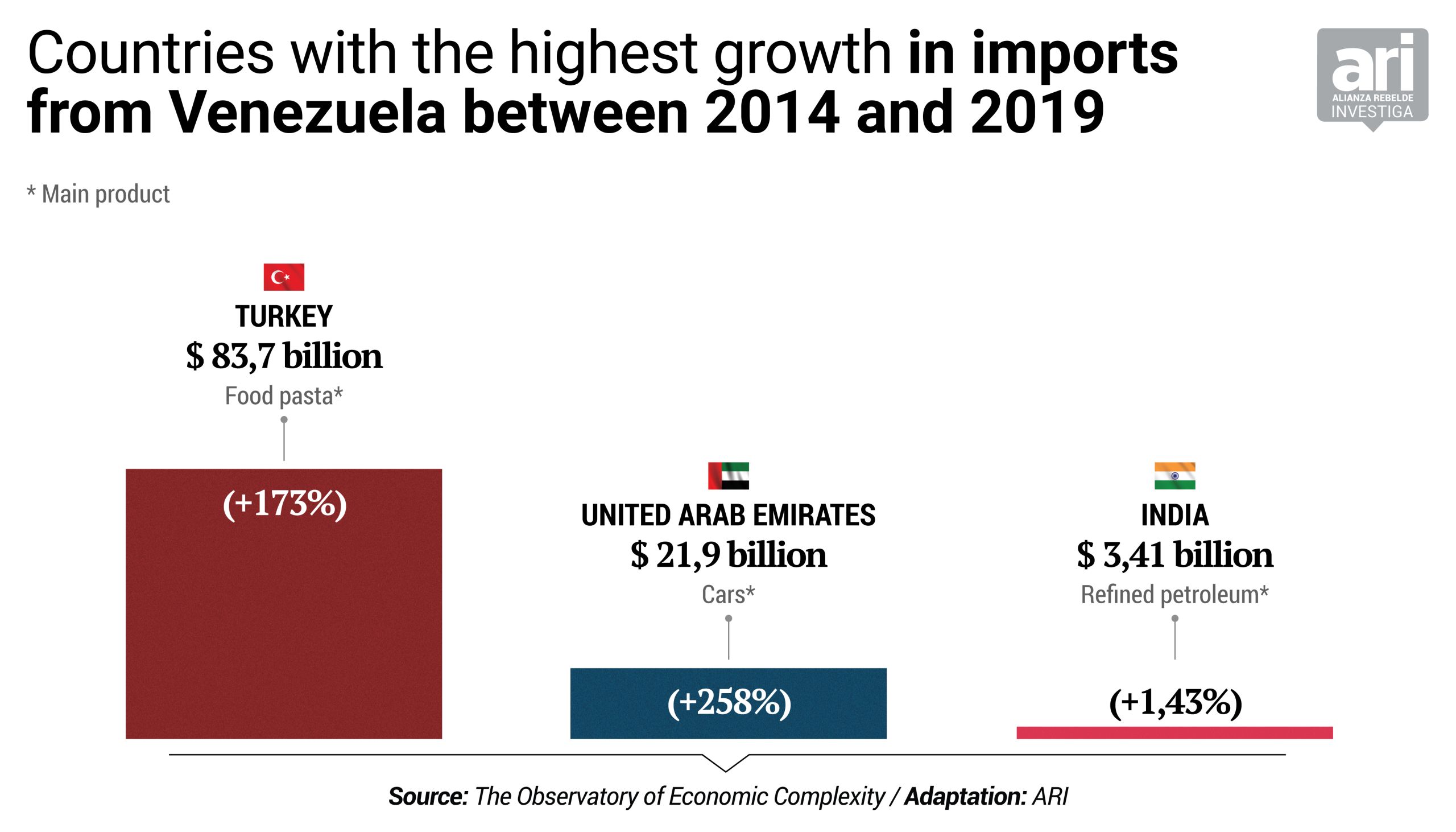
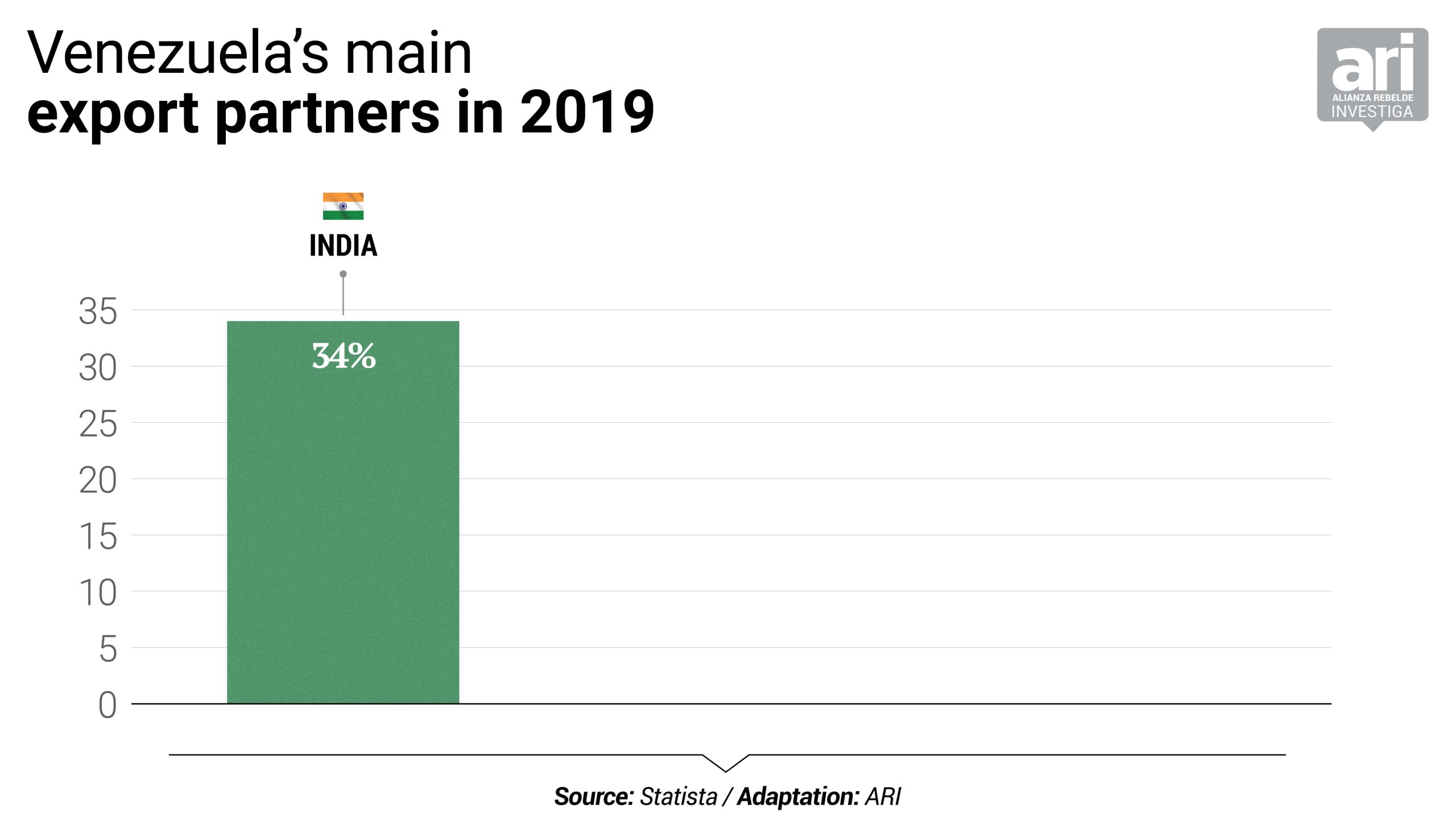
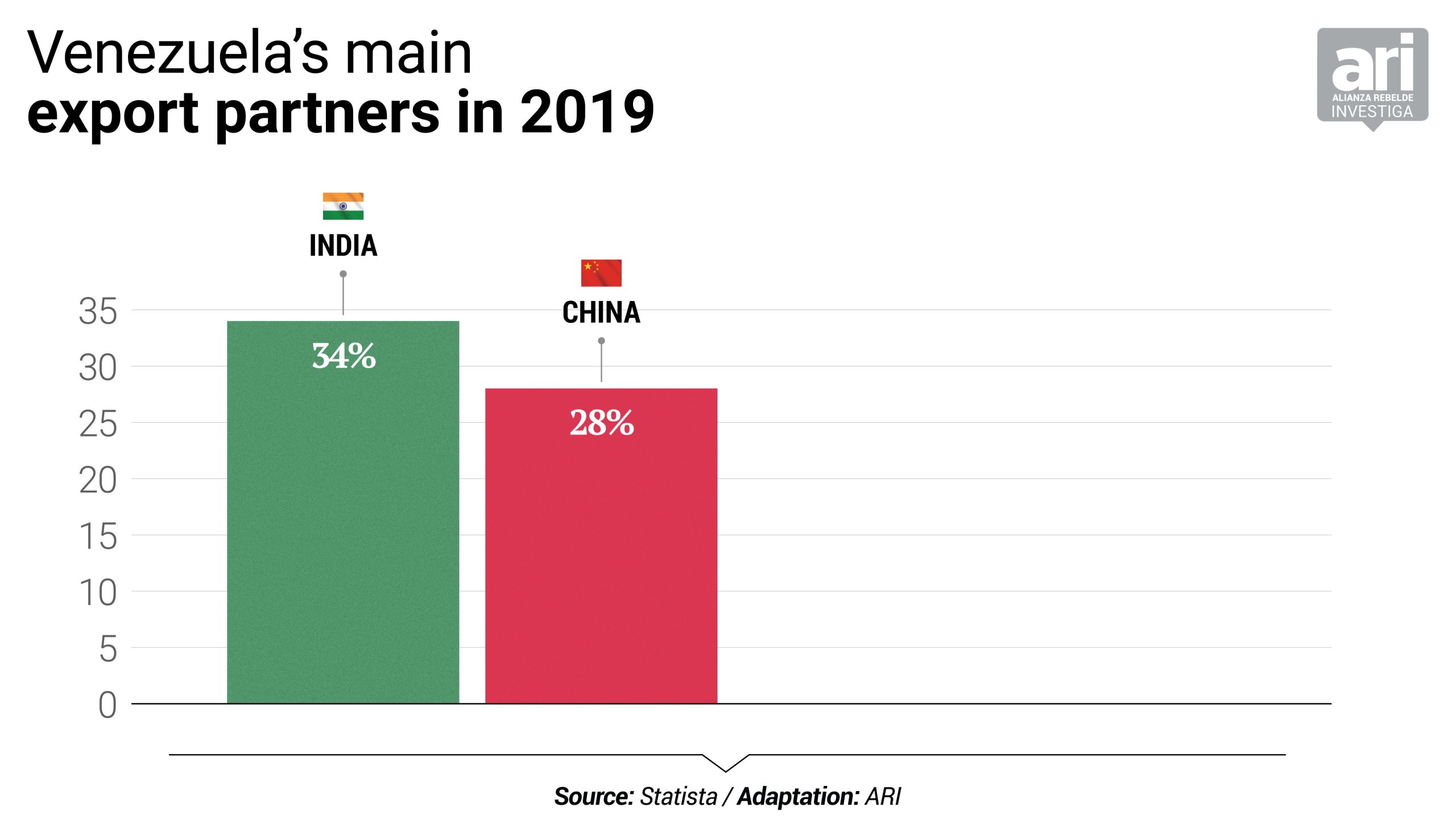
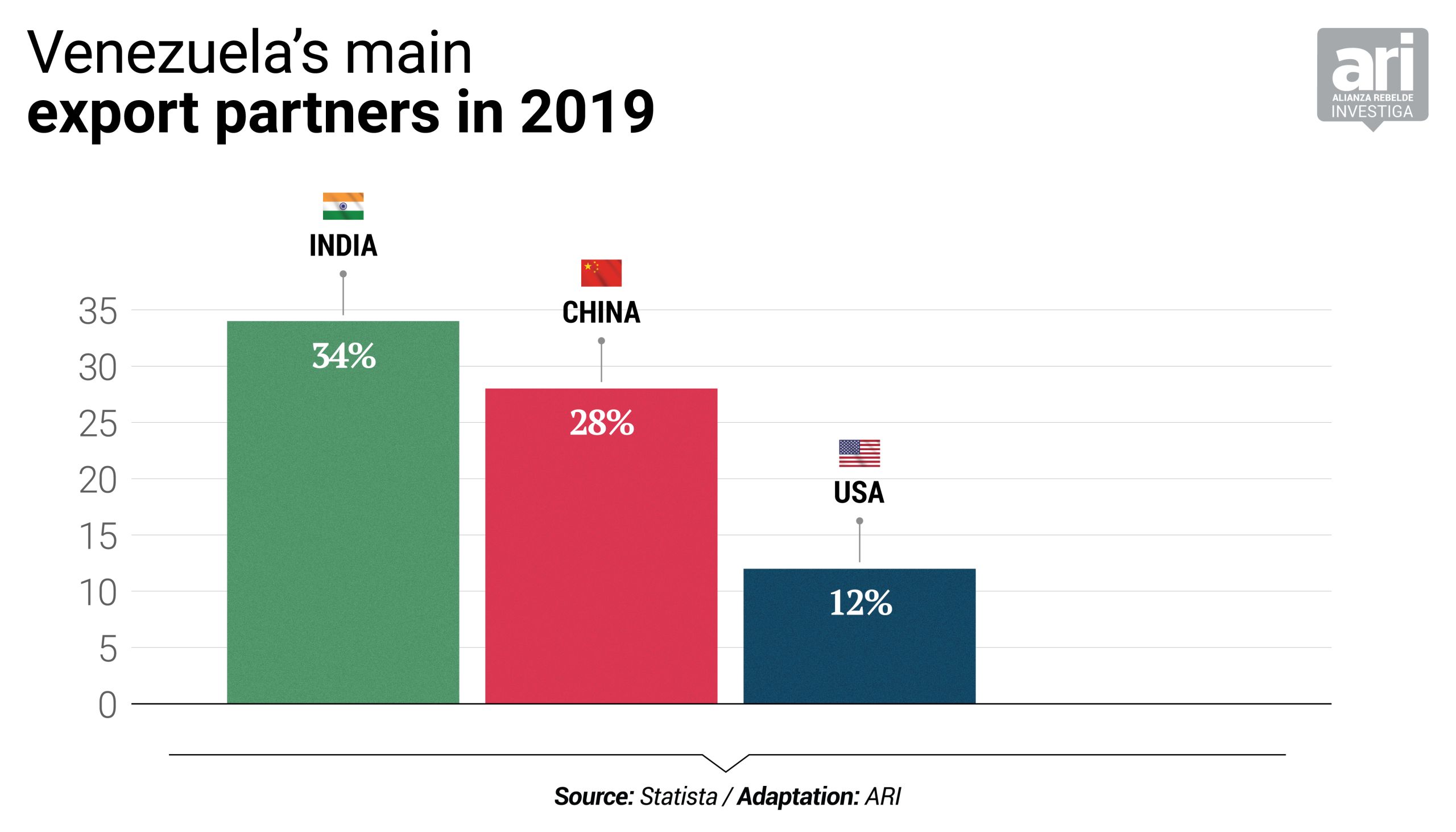
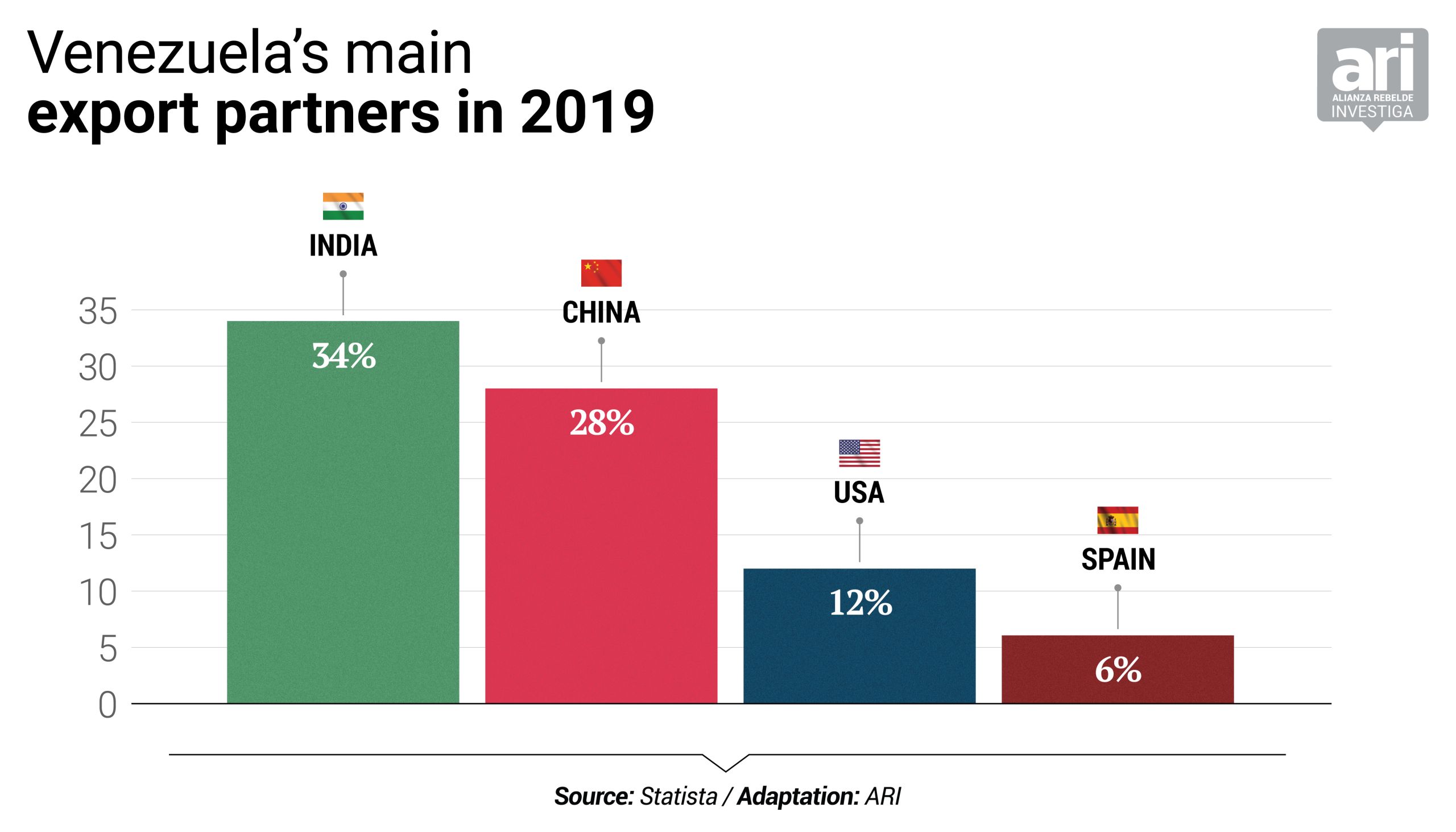
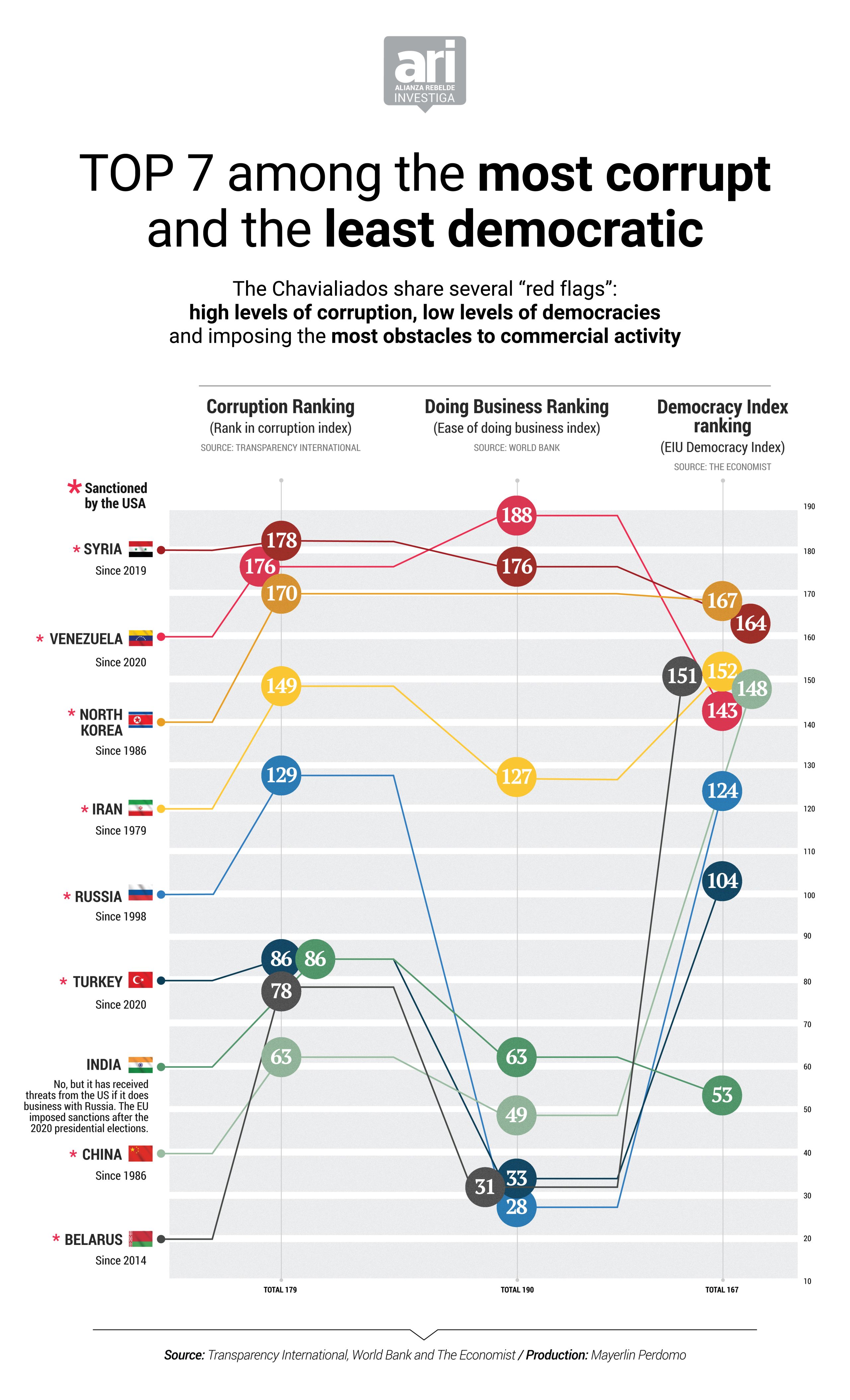
Dictatorship allies
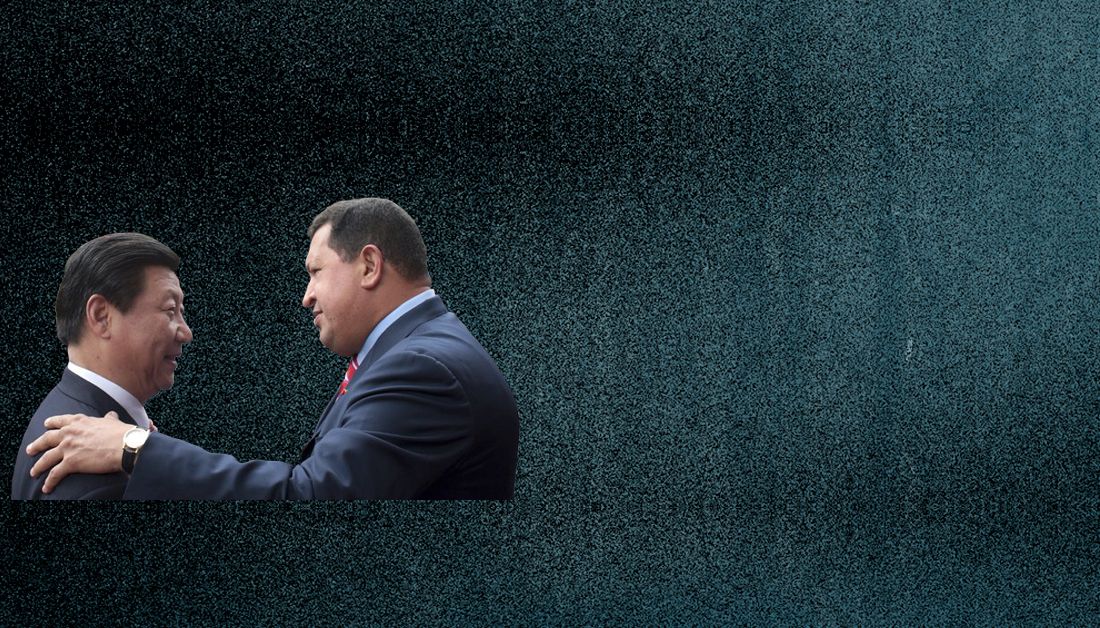
“Venezuela and its current allies are not dissimilar. They are ideological allies; allies in misfortune; and allies in the opportunity that this represents”, stated Maria Alejandra Aristeguieta, former Ambassador of the interim Venezuelan government in Switzerland.
Aristeguieta, an International Affairs expert specialized in multilateral relations, quoted a maxim that explains the basis of state-to-state relations: “There are interests, not friendships”.
The relations promoted by Chavez through the Petrocaribe project is evidence of that pragmatism. “When I speak to representatives of those states, they tell me how grateful they are to Venezuela, because it financed the construction of highways and schools, promoting their independence from the colonial past. In return, they voted in support of Venezuela at the Organization of American States (OAS). Notwithstanding, many of those countries are part of the British Commonwealth, and benefit from many United Kingdom policies. So, you can see the double standard”, stated the international affairs expert.
“We are sending flowers to Russia, and soon also to Belarus. Flowers, coffee, cocoa, banana; there is a project for cassava and its derivatives. What it reveals is the gigantic potential that the Bolivarian Revolution is awakening, through this free, sovereign and independent international policy ”.
Support to allied countries –in the ideological terrain, as well as the commercial arena– is a reality that Chavez understood and knew how to promote. A document from the Ministry of Foreign Affairs of the Indian government that summarizes its bilateral relations with Venezuela, emphasizes how in 2005, when the two countries’ commercial ties began to strengthen, there was also a surge of support in international bodies. Venezuela voted in favor of India’s candidacies to the Council of the International Maritime Organization; to the Human Rights Council for the 2022-2024 period; and to the Security Council for the 2021-2022 period.
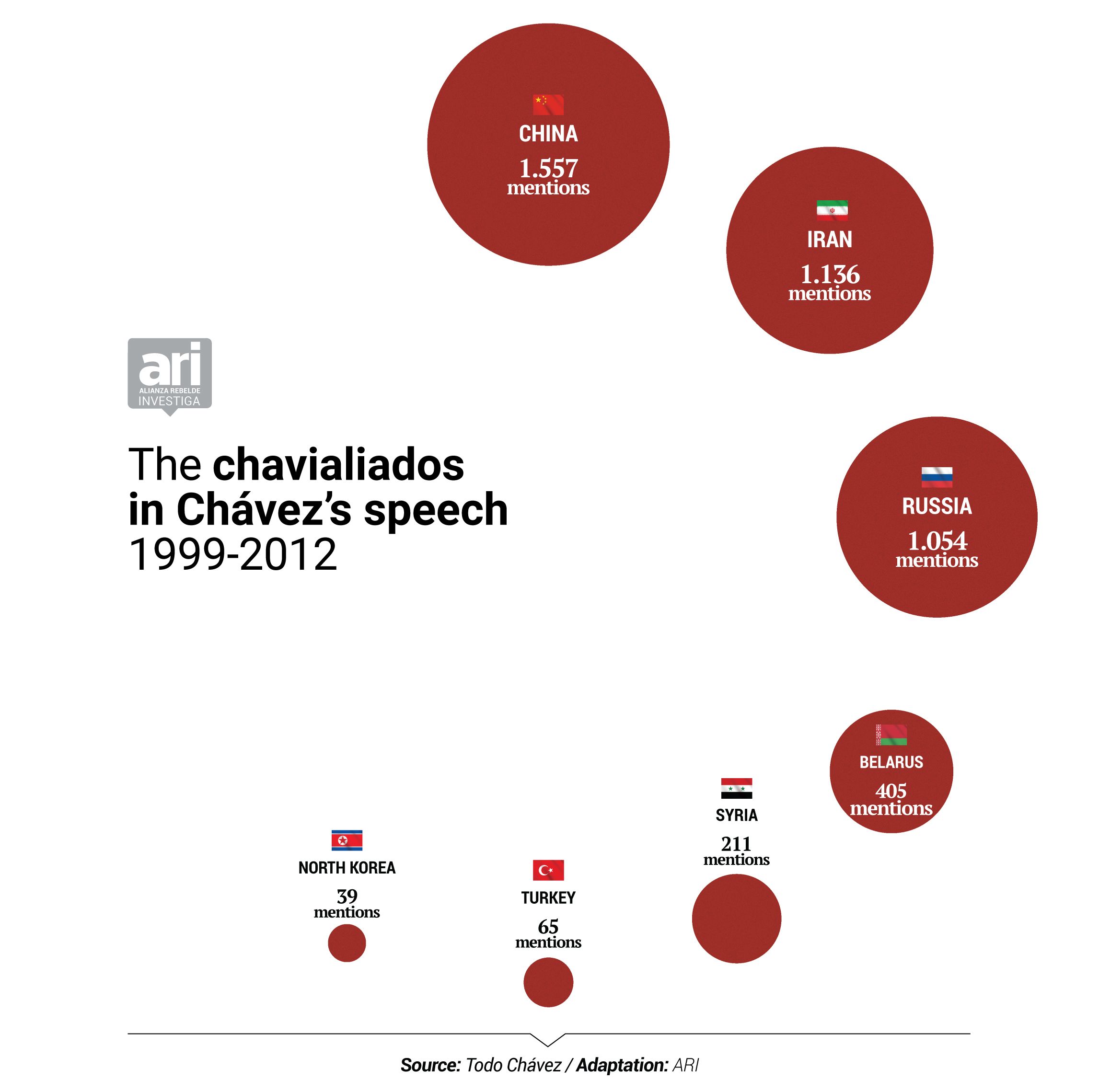
“Commercial relations are profoundly pragmatic. Let’s have a look at democratic Venezuela: who are members of OPEC? Arab countries, serious human rights violators whose support we needed to defend the Price of oil and have a larger profit margin. These types of alliances among states that have no ties except for one specific sector are very common”, argued Aristeguieta.
The difference between Venezuela’s bilateral relations of the democratic period and the current ones is that there used to be respect for the Rule of Law. “Seen from the inside, Venezuelans question the ability of other nations to see the violations of human rights perpetrated by the Maduro regime: the torture, the forced disappearances, the extrajudicial killings, the State’s negligence in the face of the pandemic; the forced migration of so many citizens who are fleeing hunger and illness. Venezuelans do not understand that this pragmatism still exists”, argues Aristeguieta.
“We are going to reinvigorate that strategic alliance between Iran and Venezuela. We know about the threats against sovereignty, the obstacles imposed by imperialism, blockades, threats, unilateral sanctions that intend to surrender the Islamic revolution of Iran, its people and its revolution, which have the full support of the people, the government and the Bolivarian revolution ”.
Venezuela used to be a great promoter of democracy among Latin American countries, said Aristeguieta. In that sense, it used to be an ally of western democracies. “We used to play to our interests: on the one hand, we promoted peace in Central America and the reinstatement of democracy in the subcontinent. On the other, we encouraged the OPEC affairs. The exact same is happening today, except we do not like it. How could we possibly like it, if Venezuela is now promoting autocratic practices because those prevail? We have gone to the dark side, and those are the values that Maduro promotes when he meets with Iran, Turkey, Syria, Russia, North Korea, and all those countries. Our allies are other dictatorships”, stated the international affairs expert.
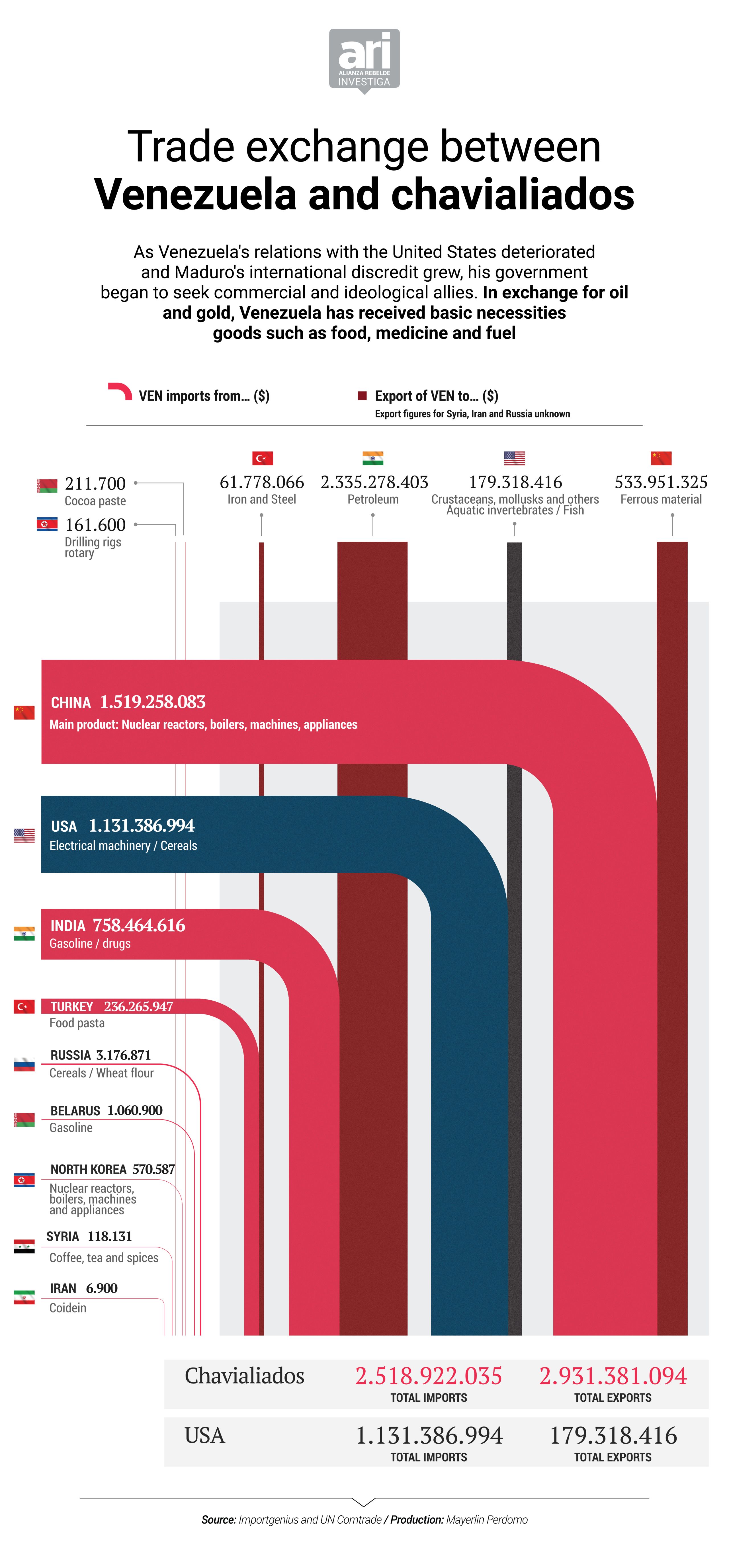
Pragmatism without ethical limitations
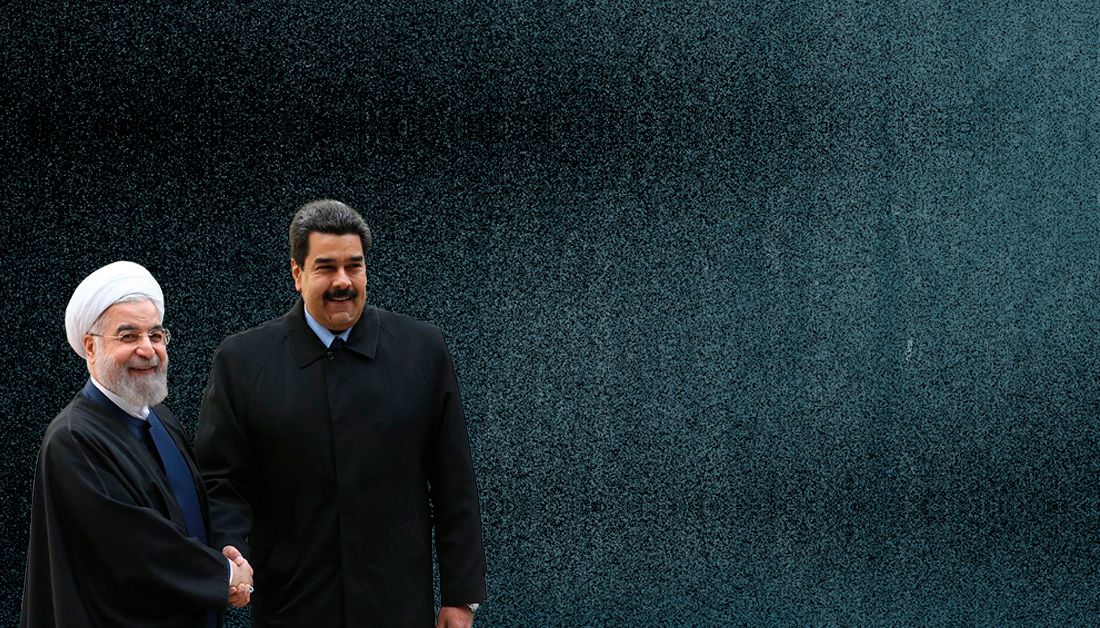
Regimes like Venezuela, which seek profitable and ideologically keen allies, abound. Over half the governments of the world are autocracies, as revealed by the latest edition of The Economist’s Democracy Index. The annual survey that rates the state of Democracy in 167 countries based on five indicators: electoral process and pluralism, the functioning of government, political participation, political culture, and civil liberties, found that in 2020 only 8.4% of the world’s population live in full democracy, while over one third live under authoritarian regimes.
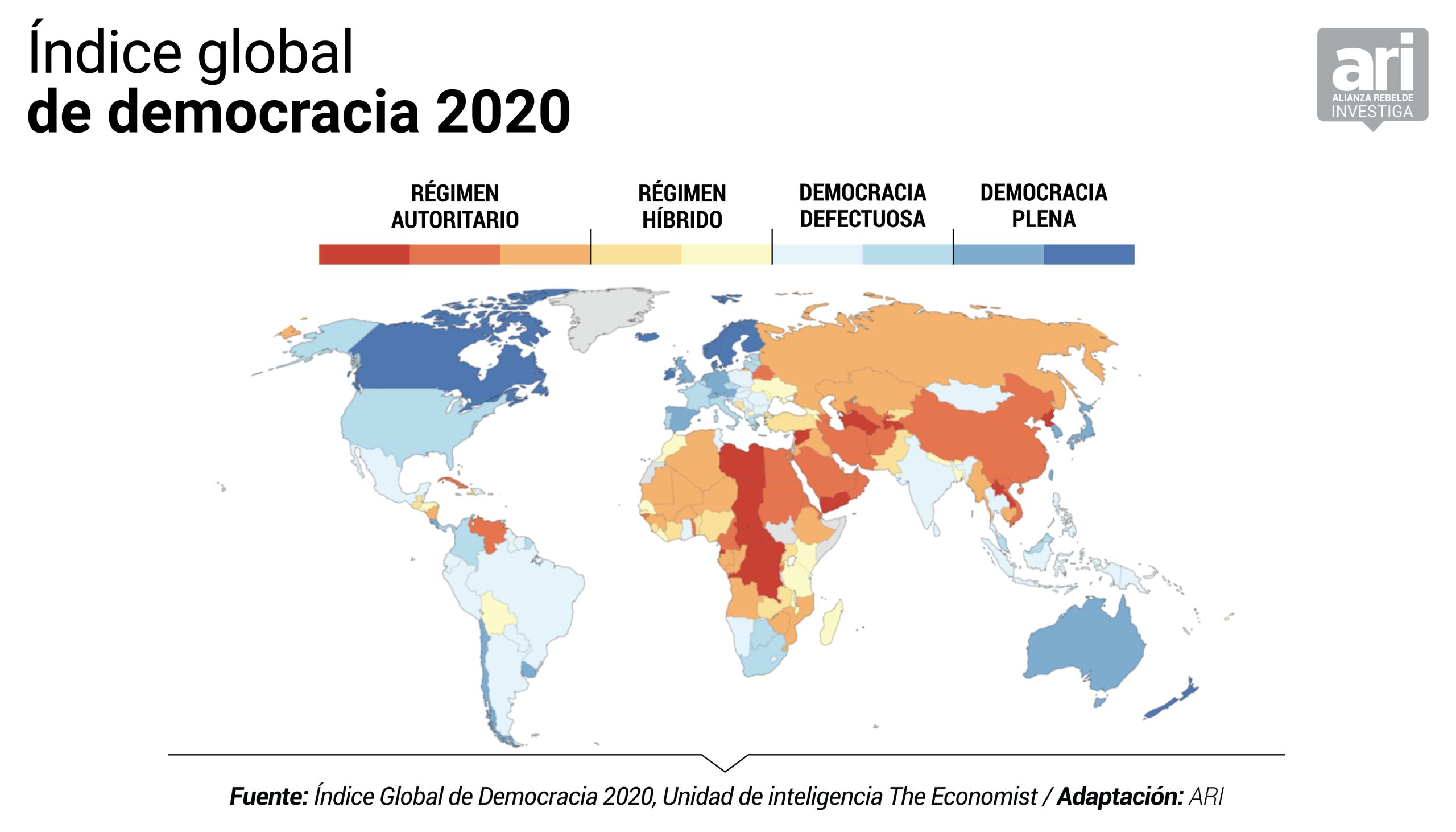
Business deals can also be concluded with consolidated democracies, such as the United Kingdom, with institutions of undoubted solvency. Freedom House revealed that between 2011 and 2020 the United Kingdom granted weapons licenses for 16,800 million pounds to 39 of the 53 countries classified as autocracies by Freedom House. Among the recipients of such sales was Libya, which received assault rifles, military vehicle components, and munitions valued in 9.3 million pounds.
“Iran and Venezuela are obliged to continue promoting and strengthening the multipolar world that has been born… we have made a set of decisions, reflected in 11 strategic documents… we have already agreed on new larger projects such as housing and the formation of micro-enterprises and industries… ”.
“Business is business. That is true. But democracy imposes ethical limitations. The level of pragmatism we see today has no restraints or limits of any kind. What we have is assault and perpetuation of power”, expressed Aristeguieta.
The Maduro regime’s alliance to these particular partners has one essential purpose: survival. “They pretend to create a front line of support in the UN Security Council, particularly Russia and China as ideological protectors. They are also seeking to ally with sanctioned states, such as Iran, Russia, Turkey, Syria, and North Korea, in order to blow up the seams of the international system and avoid commercial sanctions”, observed Farah, who asserts that the true ideology of every leader of this group of nations is to hold on to power, and they simply seek to associate with anyone who can help achieve this objective. “Since they do not share the values of the US and the European Union, they form their own block which defends dictatorships for the people under the guise of radical populism”.
"If we analyze well the countries included: Iran, North Korea, Afghanistan, Pakistan, Cuba, Venezuela, either they are already declared enemies of Washington, or they are places where there is a warlike conflict, with the exception of Venezuela ... but based on the importance that they give to the security and defense strategy of the United States and that Venezuela is considered a main adversary, this means a greater investment in all intelligence and espionage operations against Venezuela. Strategies must be developed in accordance with the threat that this represents ”.
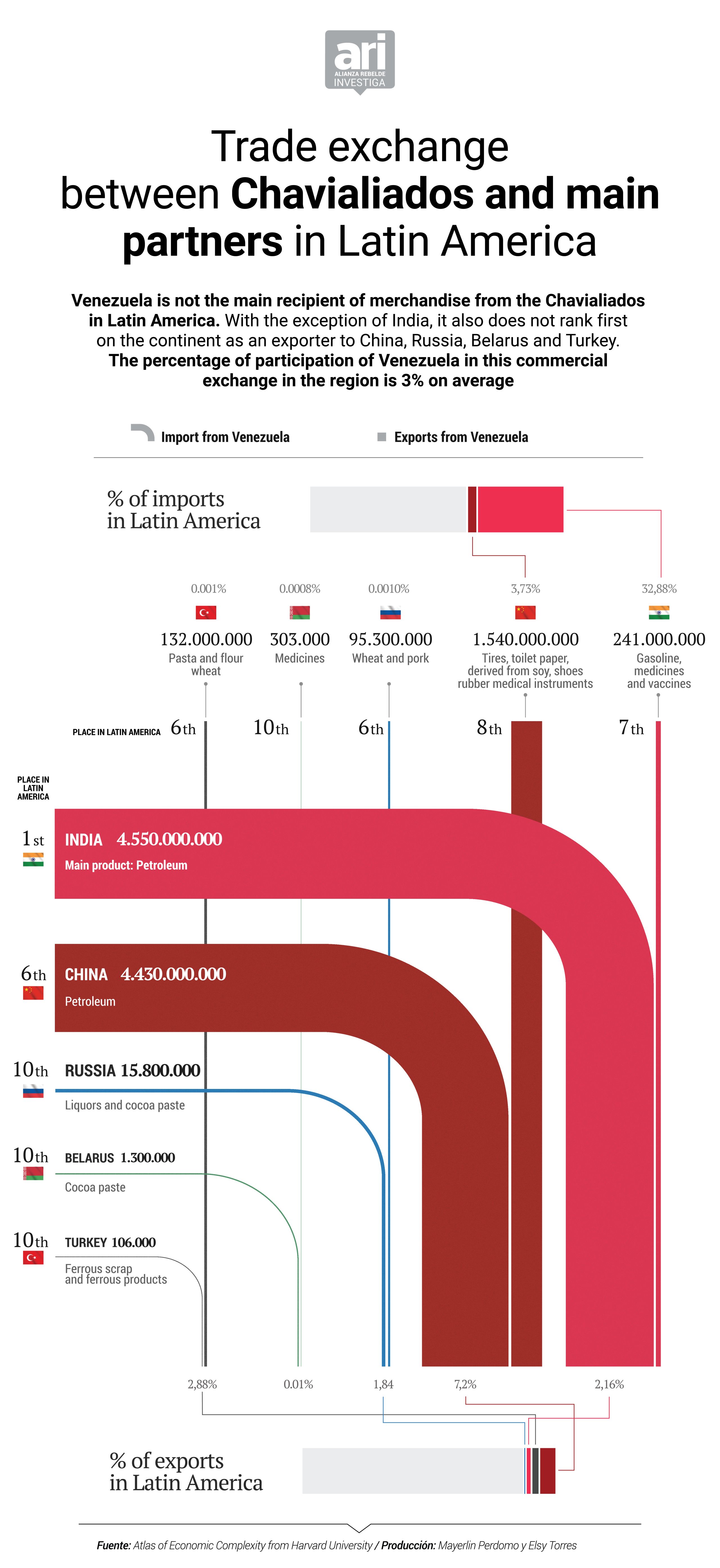
Texts
Gitanjali Wolfermann
Lisseth Boon
Infographics
Mayerlin Perdomo
Design
Carlenys Zapata
Illustration
Juan García
Animation
Wailymar Romero
Design and infographic coordination
Elsy Torres
Social networks
Luis Miquilena
Ricardo Machado
Edition
Equipo CONNECTAS
Caracas, August de 2021

